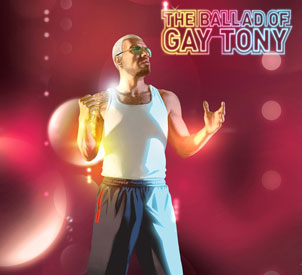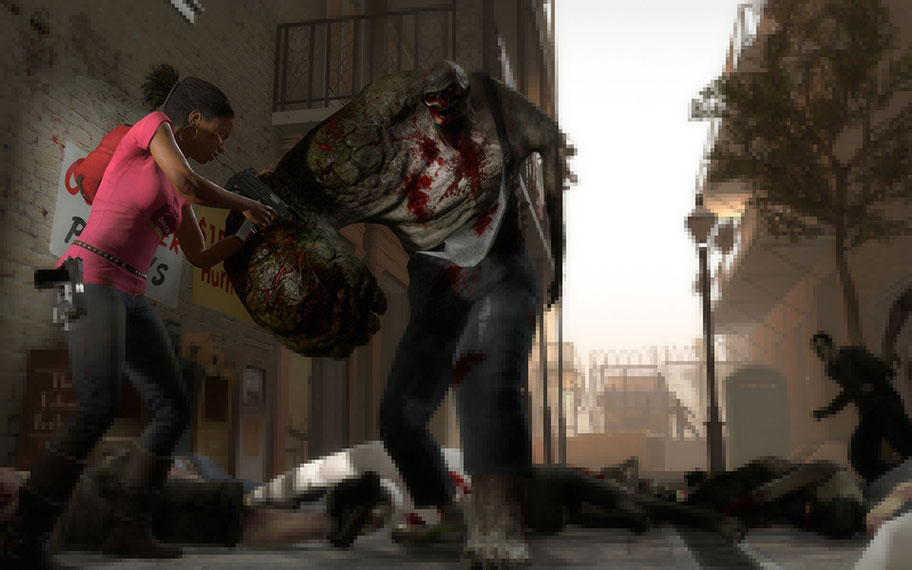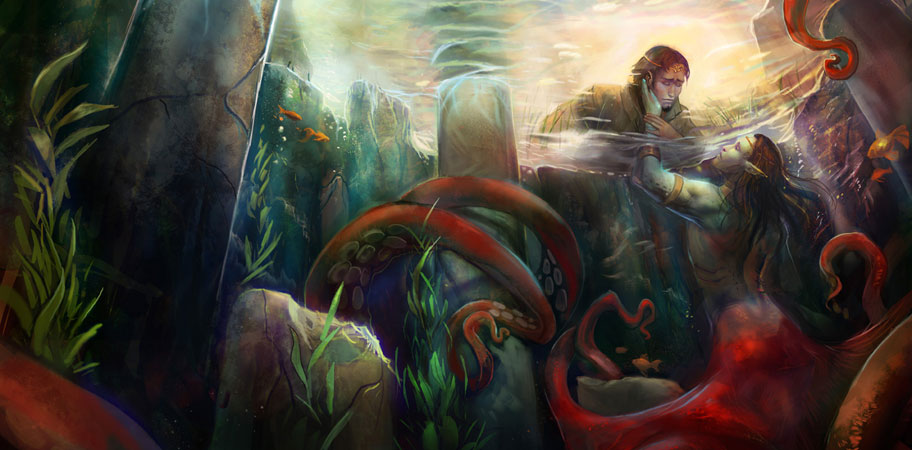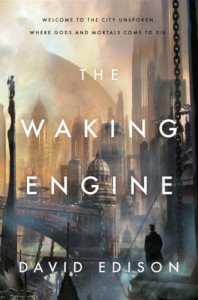I would see queer romance in a different, more nuanced light, complete with a historical perspective that both undercut Card’s work and crystallized the notion of real-world men who loved each other with their bodies as well as their minds.
Hello A Dribble of Ink! I am David Edison, author of The Waking Engine and editor of GayGamer.net, and I am dribbling my ink all over you. Aidan has asked me to talk about my experiences with inclusivity in the gaming world, which is a great chance to look at the differences and similarities with the equivalent challenge in the world of speculative fiction. I’ll apologize in advance for being unscholarly and scatterbrained: these are, of course, sprawling and complex dynamics, and a genuine analysis is beyond both the scope of a blog post and the capabilities of yours truly.
Let’s start with the idea of finding yourself reflected in the creative works you consume. From my personal experience: I encountered a representation of my own queerness in speculative fiction well before I encountered it anywhere else in our culture, especially games. Orson Scott Card’s Songmaster hit me like a ton of bricks at nine, maybe ten years of age. (There is irony to be found there, of course, which is its own post, methinks.) The pedophilia went right over my young head (paging Alanis Morissette and her 10,000 not-actually-ironic spoons, and yet another blog post), but what mattered to me then, as now, was the love. Only a few years later, when I read Mary Renault’s stunning historical novels like Fire from Heaven, The Mask of Apollo, and The Persian Boy, I would see queer romance in a different, more nuanced light, complete with a historical perspective that both undercut Card’s work and crystallized the notion of real-world men who loved each other with their bodies as well as their minds.
For a young queer man, especially a reader, discovering multiple sources of my own nature (which I had realized at a much younger age than 9 years old, though I did not have the words for it) was a lifeline: suddenly I was a part of the world. Moreover, I could decide between different representations of myself and begin building an identity in concert with reality, rather than wondering if perhaps, to my horror, I might be the only one.
Then came Mercedes Lackey, and Ellen Kushner, and Richard Bowes, and my one true lifesaver, Storm Constantine, whose Wraeththu trilogy did far more than represent my sexual identity: it handed me the keys to writing my own entry into this strange, lovely, queer canon.
Meanwhile, at the very same ages, I was rescuing Princess Peach from Bowser’s castle. Aside from Samus Aran’s hair-flip in Metroid, there was very little representation of anything remotely feminist, queer, or nonwhite in that video game life. This disparity between book and game would become the reason I sought to help create a space in the gaming world for queer men, and GayGamer.net is the result of the frustration a generation of young queer men felt at their invisibility within the medium they loved.

“We do not want “Grand Theft Auto: Fabulous,” I say here, “We only want the opportunity to be ourselves while playing Grand Theft Auto.”
Not for nothing did I end up on MTV News, a hundred million years ago, asking to see myself represented in the games I loved in the same (small, very small) way I had found myself in speculative fiction. “We do not want “Grand Theft Auto: Fabulous,” I say here, “We only want the opportunity to be ourselves while playing Grand Theft Auto.”
Did Sam Houser, head of Rockstar Games, see that clip? Yes. Did my entreaty have anything to do with the release, several years later, of Grand Theft Auto: The Ballad of Gay Tony? Unlikely—Rockstar has made a fortune pushing the boundaries. That said, it didn’t hurt: not because I am anything particularly special, but because I made myself visible. You can’t achieve equality if you are unseen, unheard, unnoticed. You must stand up and ask for what you want.
In the modern speculative fiction world, we have luminaries like Samuel R. Delany, who have been visibly queer and nonwhite since video games were little more than Pong. We have Nisi Shawl and Cynthia Ward, who literally wrote the book on writing the inclusive book. Their sensitive, insightful, instructive missive, Writing the Other, was given to me by mentors who think it mightily important that writers learn how to include a diversity of characters in their work. This is something that many spec-fic writers think is crucial to understand before we try to broaden the inclusivity of our genres, which is something we already want to do.
Not so, in video games. Not only was there an absence of queer representation in the medium, but there was a thoughtless lack of understanding (from both game devs and gamers) of why we would want to see ourselves in games, period. I spent most of 2006 explaining that while Mario and Duke Nuke’em were great, queers and women and people of color were not, in fact, satisfied with being nearly invisible in the industry to which they dedicated their time and dollars.

Yes, video games have always had their advocates. Brenda Romero, whose excellent book Sex In Video Games did wonders to further certain conversations, remains a strong voice for inclusive-thinking in games. Ditto Ian Bogost, Leigh Alexander, Mattie Brice, and many more. But the facts on the ground for the video game industry remain bleak: the developer demographic skews strongly toward white men, mostly straight, and when you go to a video game convention, you will see that lack of diversity on the creator side quite starkly. On the consumer side? Women and people of color and queers are as present-and-voting as we are in the rest of society! The demographic who creates games lacks diversity, and this translates directly to a lack of diversity in the medium, despite the obvious diversity of gamers ourselves.
This has begun to change, painfully slowly. People of color and women are half of the playable characters in the Left 4 Dead series, and The Last of Us tells the story of a tautly-wound father-daughter relationship and features some queer representation. Left 4 Dead 2 has a female woman of color as a player-character, which made me happier than I can say.
The bottom line, however, is that neither industry is doing this well enough. Video games need more advocacy and, frankly, a hiring revolution. Speculative fiction needs to continue its good work, and we need more books written by women and people of color, reviewed-by, celebrated-by. We may have centuries of inclusivity behind us (hello, Mary freaking Shelley), but both books and games stand in a similar position in our current era of rapidly-evolving social justice: we can, and must, do better. Much better.
The differences between the two media are vast, and beyond the scope of this rambling post, but and of course the two industries are not the same. And yet, in so many ways that matter to so many less-visible people, we are.




Although I am heteronormative, one thing I appreciate about many of the Bioware games (since you did mention video games) is that many of the non player characters, especially in Dragon Age I/II, can be romanced by either gender, and with no social stigma. It simply is part of the universe.
It is sad that this is the exception and not the rule, and other media as well.
I guess it deserves to mention the A land fit for heroes series where 2 of the main characters including THE main character Ringil are both gay and lesbian, I have seen this topic came up before mostly in Reddit when it comes to the portrayal in SF/Fantasy and this series is never mentioned. A great part of the books is that by all accounts both this guy and gal are badasses they just happen to like men/women. Baby steps I guess but at least it’s something.
Something that always struck me with the Ballad of Gay Tony expansion is that they actually chose Tony and Luis to be latinos, since to be honest here in Latin America we’re still ages behind when it comes to be more receptive at least in the mainstream media as a straight male I saw it as a popular game kinda breaking two stereotypes at once and of course it helped that it was a great and fun expansion.